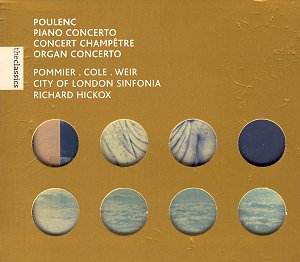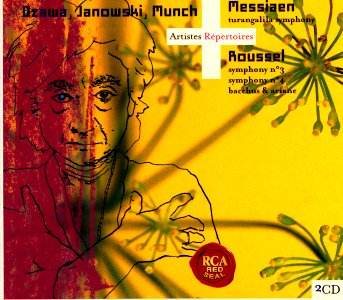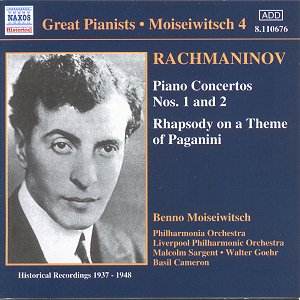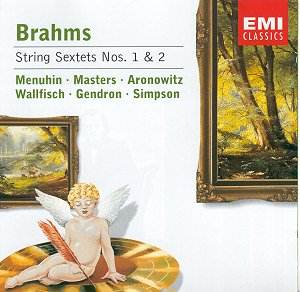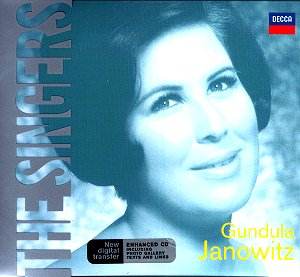 Composer: Gundula Janowitz
Composer: Gundula Janowitz
Works: Arias by Weber & Wagner, Lieder by Schubert, Vier Letzte Lieder (Four Last Songs) by R. Strauss
Performers: Gundula Janowitz (soprano), Irwin Gage (piano), Orchestra of Deutsches Opera, Berlin, Ferdinand Leitner, Berlin Philharmonic, Herbert von Karajan
Recording: Berlin, Germany, 1967-77
Label: Decca
The latest entry in Decca’s “The Singers” series features the sublime voice of Gundula Janowitz, a luminary of the opera world whose career blossomed in the mid-20th century. Janowitz made her debut at the Vienna State Opera in 1960 and quickly ascended to prominence, becoming a favored artist in the repertoire of Richard Strauss, Wagner, and Weber under the baton of eminent conductors such as Herbert von Karajan and Carlos Kleiber. This compilation captures selections from her artistic journey, offering a glimpse into her interpretative range and vocal prowess during key periods of her career.
Janowitz’s voice, characterized by its creamy lyricism and shimmering high notes, finds a compelling vehicle in the opening aria, “Wie nahte” from Weber’s Der Freischütz. The ethereal quality of her upper register is immediately apparent, though one senses that her interpretative abilities evolve over time. The subsequent cavatina “Und ob die Walke” reveals a more developed character portrayal than in her earlier recordings, demonstrating a richness that emerged in the 1970s when she delved into heavier Mozart roles. This progression is emblematic of her growth as an artist, showcasing a voice that matured alongside her experience.
The orchestral color provided by the Deutsches Opera under Ferdinand Leitner offers a lush backdrop for Janowitz’s interpretations, particularly in the extracts from Wagner’s Tannhäuser, where her portrayal of Elisabeth is both poignant and striking. Here, the combination of her vocal beauty and the orchestral palette melds seamlessly, allowing the listener to experience the spiritual depth of the character. In contrast, the aria “The Ocean, thy mighty Monster” from Weber’s Oberon hints at a slight strain at climactic moments, where Janowitz’s voice feels less robust than in other selections. This inconsistency could be attributed to the demands of the lyric soprano repertoire, particularly in the context of her evolving vocal technique.
The inclusion of Strauss’s Vier Letzte Lieder is a highlight, featuring Janowitz at the pinnacle of her interpretative powers. Her reading of “September” is particularly notable, as it showcases her ability to convey profound emotional nuance, rivaling the interpretations of contemporaries such as Elisabeth Schwarzkopf and Jessye Norman. The recording quality, reflective of Deutsche Grammophon’s highest standards, allows for a rich tapestry of sound; however, it is worth noting that tracks 10-13 are mixed at a notably higher volume, which can disrupt the listening experience.
Irwin Gage’s accompaniment provides a solid foundation throughout, demonstrating both sensitivity and technical prowess that complements Janowitz’s artistry. The integration of Schubert’s lieder into this collection reveals a late-blooming depth in Janowitz’s interpretations, particularly in the contrasting emotional landscapes of the two included songs. The expressive weight she brings to these works underscores her growth as a lieder singer, a realm she explored more fully in her later career.
This compilation, while somewhat idiosyncratic in its repertoire selection, serves as an illuminating testament to Gundula Janowitz’s artistry. It captures a significant span of her career, even if it lacks representation of her Mozart roles and choral works that are so integral to her legacy. The accompanying essay by Richard Wigmore is commendable, providing context and insight that enrich the listening experience.
Janowitz’s contributions to the operatic landscape, particularly through this recording, embody the essence of a soprano whose artistry transcends mere vocal prowess, reflecting a profound engagement with the music that resonates deeply with audiences.
